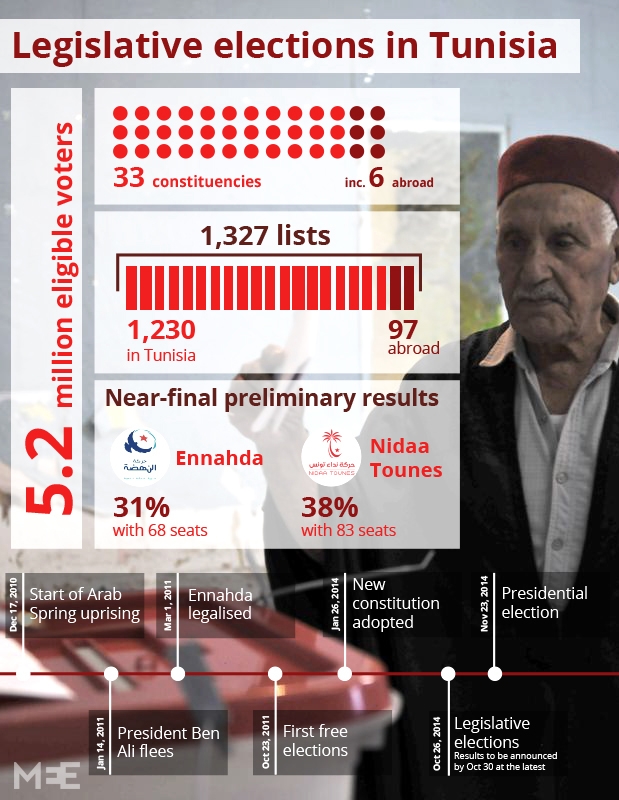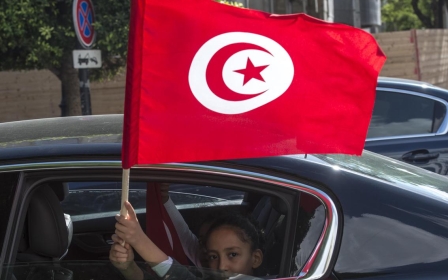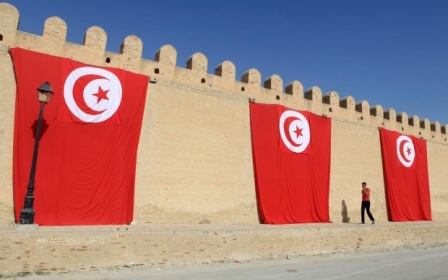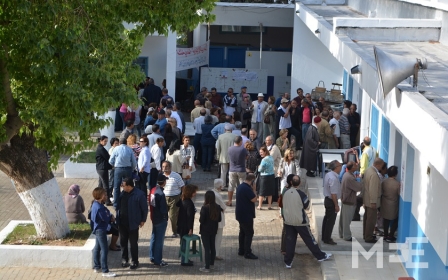Nidaa Tounes may shun Ennahda in government formation: party official

Nidaa Tounes will seek to form an alliance of “democratic” parties which will not include its main rival Ennadha, a senior party official said on Tuesday.
Nidaa Tounes - or 'Call of Tunisia' - won the largest number of seats in the country’s parliamentary elections that took place on Sunday, but failed to secure an outright majority, meaning it will have to form a coalition government.
According to the latest results, Nidaa Tounes, won 84 seats, or 38 percent of the vote, while Ennahda won 69 seats, or roughly 31 percent of the total vote.
The Liberal Free Patriotic Union meanwhile clinched 17 seats, the leftist Popular Front 12 seats and liberal Afek Tounes nine seats out of the total 217 - including 18 seats earmarked for Tunisians living abroad. An alliance needs to reach a threshold of 109 for a majority.
"If we have to form an alliance, it would be with the democratic parties; the Popular Front, Afek Tounes and Social Democratic Path," Aymen Bejaoui, a senior party member, told Anadolu Agency.
Nidaa Tounes has "a moral obligation" towards the supporter of the smaller parties to try and avoid divisions created after the last elections, Bejaoui added.
Another senior party member Kacem Makhlouf, from the northeastern city of Monastir, also appeared to corroborate the government formation plans.
"We will make a coalition with parties that shares the same ideas with us,” he said.
While the election regulatory body has until 30 October to announce the final result, Ennadha on Monday conceded defeat and said it would seek to form a unity government with Nidaa Tounes.
“We have accepted this result and congratulate the winner,” Lotfi Zitoun, an Ennahda party official, told Reuters, while reiterating the party’s long-held stance that it wanted to form a unity government.
Nidaa Tounes is seen as Tunisia’s main secular party and houses a number of politicians from the era of former president Zine El Abidine Ben Ali who was overthrown by a popular revolt in 2011. It is led by 87-year-old former Prime Minister Beji Caid Essebsi, who has tried to rebrand himself as a steady hand, and now looks set to head the government formation talks.
Following the fall of Ben Ali, Ennadha emerged from 2011 elections as the country’s biggest party, winning the majority of seats in the country’s constitution making assembly. It ruled in a coalition government with two secular parties, Congress for the Republic (CPR) and Ettakatol (Democratic Forum for Labour and Liberties), until a political crisis at the start of the year prompted Ennahda to step aside in favour of a caretaker government.
The country’s first presidential elections are now scheduled to take place on 24 November, with some analysts suggesting that government formation may drag on until then.
Ennadha is controversially not putting forward a candidate, but was expected to use its political sway to secure control of several key ministries.
The movement has long called for an agreement to be made on the “consensus candidate” although it has not yet put its weight behind any hopefuls.
New MEE newsletter: Jerusalem Dispatch
Sign up to get the latest insights and analysis on Israel-Palestine, alongside Turkey Unpacked and other MEE newsletters
Middle East Eye delivers independent and unrivalled coverage and analysis of the Middle East, North Africa and beyond. To learn more about republishing this content and the associated fees, please fill out this form. More about MEE can be found here.





